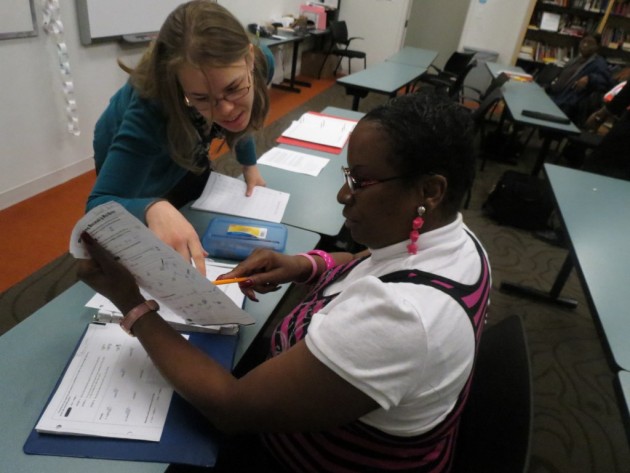How Will the Department Handle Voting Rights Act Violators?
In the presidential primary elections Keshia Anderson attempted to vote twice. After parking problems thwarted her first attempt, she returned after work and stood in line for more than two hours. She voted. But like many of the Chesterfield, VA residents her vote didn’t count. Her precinct had run out of democratic ballots. As instructed by election officials, Anderson wrote her candidate of choice on a torn sheet of paper.
These are the types of problems that the Senate Judiciary Committeesays should be prevented by the Department of Justice.
On Tuesday, the judiciary committee had one question for the justice department: “What steps they are going to take before the elections to ensure that all eligible votes are counted and that voters are not disenfranchised?”
“I want to – again – ask the justice department if they have the tools necessary to combat deceptive practices in the upcoming election,” said Senator Benjamin Cardin (D-MD).
Primary Problems
During the primaries, Cardin said that there were widespread voting issues in minority neighborhoods. He also said that in an effort to try an diminish the importance of minority voters, “misleading information” was distributed in Maryland, New Jersey, New York and many other states.
“That goes well beyond what is acceptable in American politics,”he said.
Cardin outlined some of the problems seen at last years presidential elections.
“There was literature that was targeted at minority communities that gave the wrong date of elections,” he said. There was information handed out in California to [legal] immigrant communities … warning them that voting in a federal election is a crime that could result in incarceration and possible deportation. There was information given out giving the wrong voter date in my own state of Maryland.”
Grace Chung Becker, acting assistant Attorney General for the justice departments Civil Rights Division, defended the department saying they are prepared. She citied many cases the department has filed against violators of the Voting Rights Act in their efforts to protect citizens’ right to vote.
“The justice department is doing its part,” said Becker. “We’re fortunate to have a tremendously talented and hardworking team … and I’m proud of their accomplishments.”
She continued: “Since 2006, we have filed seven cases under section 2 of the voting rights act involving vote dilution and vote intonation.”
Section two of the Voting Rights Act prohibits discriminant voting practices.
Becker added that the civil rights division “will take action” if any voting law is enforced in a discriminatory manner.
Military Personnel
Residents like Anderson, aren’t the only type of U.S. citizens the judiciary committee wants to have a fair chance to vote this November. Senators Tom Coburn (R-OK), John Cornyn (R-TX), Sheldon Whitehouse (D-RI) and Cardin all agreed that the percentage of votes received from military personal living abroad was “shameful.”
According to the 2006 Election Administration and Voting Survey, only 5.5 percent of uniformed and oversees military voted.
Brian O’Leary, Capitolink Director who served in the marines as an F8 hornet pilot, said this low turnout is because of the lack of information and a “burdensome” military voting process.
“I saw these problems first hand as a voting assistance officer in the marines,” said O’Leary. “Our military men and women serve around the world and risk their lives in defense of freedom and yet their own ability to exercise their fundamental rights are being obstructed.”
O’Leary suggested that the “Department of Justice press the Department of Defense and state election officials” to ensure that oversees citizens are given enough time to receive and return their ballots on time.
Cornyn said that the department of defense has “failed to adequately educate” enlisted men and women about how to vote.
“Because they do much to protect our rights, I think justice demands that we do everything in our power to protect theirs,” said Cornyn. “The department of defense has a legal duty to educate and assist our service members in voting and the evidence has shown that the department of defense has failed.”
He continued: “Far to often, these very same women and men who are wear the uniform of the United States of America and who are fighting to sacrifice, in some cases everything, to protect our civil rights, are themselves not able to exercise their right to vote.”
Becker said that the department of justice is working with states to ensure that soldiers, sailors, airmen, marines and other oversees citizens have the “full opportunity” to participate in the presidential election.
“Last month I joined the Dept of Defense in sending letters to all 50 states emphasizing the need to provide at least 45 days for absentee ballots to be mailed and returned, said Becker. “We’ll continue to work with the states and if necessary file lawsuits.”
Election Day Tactics
On election day, Becker said the division has a plan to help counter discriminatory acts.
“The divisions election monitoring program will ensure that federal voting rights are respected on election day,” she said. “On Nov. 4 we will coordinate the appointment off hundreds of fed government employees in counties, cities and towns across this country.”
After Cardin voiced concerned about residents level of comfort if they thought they were being watch, Becker said that the government employees will blend in with everyone else and will not like police enforcement.
The department will also have a toll free hot-line for reporting problems.
Becker said that the justice department and the Senate Judiciary committee “share a common ground” to ensure that discriminatory issues are “actively” handled and that on November 4 every vote counts.

